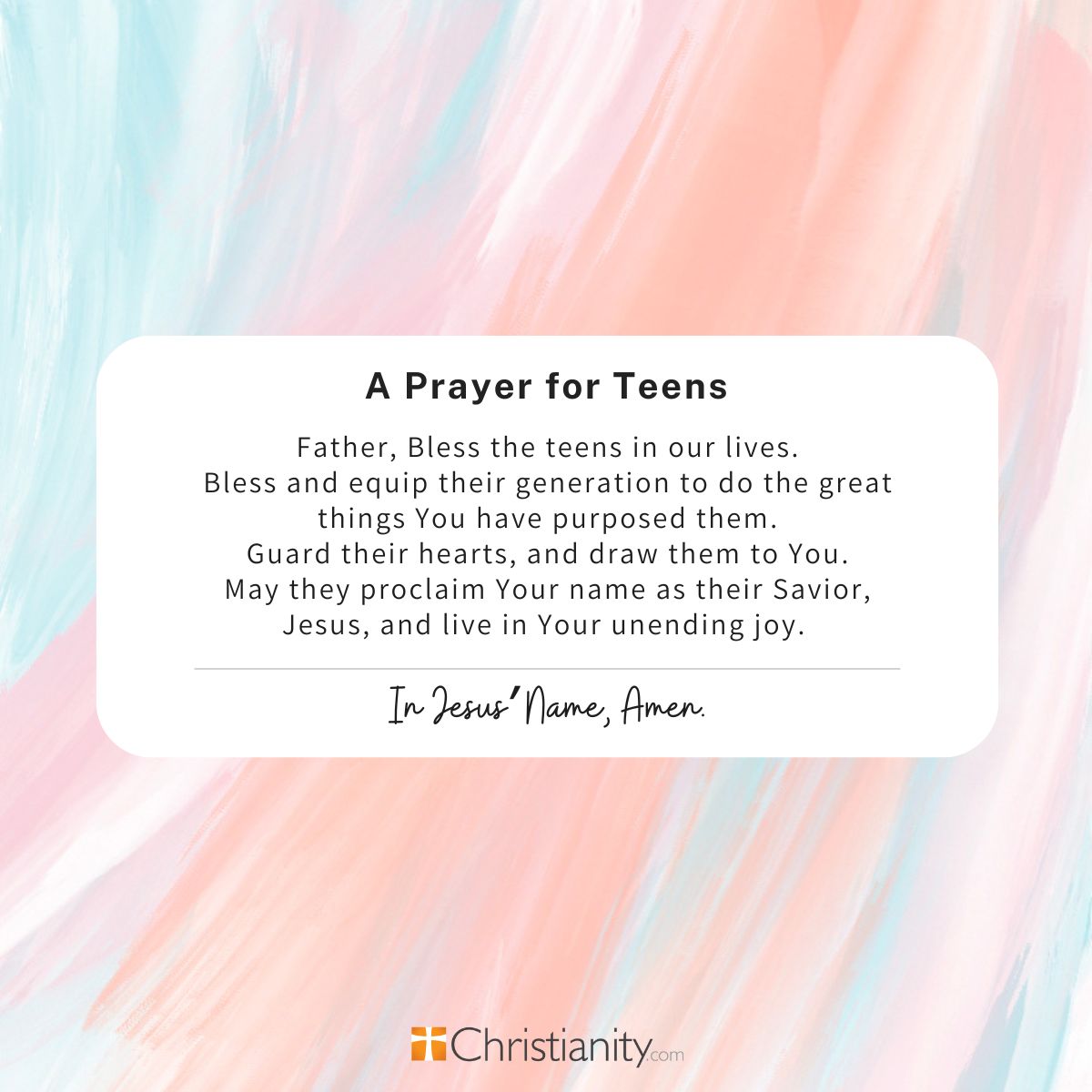
I took my kids to see Inside Out 2 on opening week. All three of my teenage sons (and me, their mom) left with a few tears in our eyes. The movie, about the emotional development of a young teenage girl named Riley, contained a lot of emotional lessons about mental health, wholeness, and coming of age. But the movie also contained a few surprising spiritual messages, ones that would be meaningful to consider and even talk about as a family. Without giving away any major spoilers, here are ten of these hidden spiritual lessons from Inside Out 2:
Photo Credit: ©Pexels/Andrea Piacquadio

1. Our Identity Is a Beautiful Paradox
In Inside Out 2, the main character, 13-year-old Riley, wrestles with what seems like contrasting parts of her personality—her goodness, her kindness, her compassion towards her friends and her jealousy, her shame, and her anger. This is a beautiful spiritual insight. The first book of the Bible, Genesis, declares that when God created humanity, God called us “very good” (see Genesis 1:31). God created men and women in his divine image, blessed us and gave us purpose (see Genesis 1: 26-31). But we also know that isn’t the whole story. Genesis 3, just a few pages later, reveals that humanity “fell” from that goodness by choosing sin and disobedience. In that way, brokenness and pain, which includes emotional wounds and unhealth, crossed paths with our created goodness (see Genesis 3). But the good news is that when we place our faith in Jesus, his Spirit makes us new (2 Corinthians 5:17) from the inside out. Still, we are always in process. We exist as a paradox, broken and being healed, very good and sinful, struggling and deeply loved by God.
"This means that anyone who belongs to Christ has become a new person. The old life is gone; a new life has begun!" - 2 Corinthians 5:17 NLT

Photo Credit: ©GettyImages/Merlas

2. Transform Anxiety into Spiritual Opportunity
Anxiety does not have to control us, but we can learn something from it. Without giving away too much of the plot, one of the new emotions/characters that enters the Inside Out canon is Anxiety, voiced by actress Maya Hawke. Part of the movie’s plotline includes the story of Riley learning to navigate this new, overwhelming emotion and the emotion/character Joy, played by Amy Poehler, trying to ignore Anxiety’s existence. There’s a beautiful spiritual lesson here about our own anxiety; we might have it now or will one day have to face it, and though it’s counterintuitive to do so, we don’t have to fear or even ignore our anxiety. We can allow our anxious thoughts to lead us to Jesus. The Bible, in 1 Peter 5:7, invites us to
“Cast all your cares on God, for God cares for you.”
When we deal with worry, anxiety, or any similar emotion, we don’t have to avoid it, ignore it, or pretend it isn’t there. Instead, we can tell God about our fears, concerns, and worries and ask God to carry them so that we don’t have to let anxiety carry us.
Photo Credit: ©GettyImages/BulatSilvia

3. Trials Allow Spiritual and Emotional Maturity
Trials are how we grow in spiritual and emotional maturity. In watching Riley’s coming of age, her parents struggle with the changes—developments that many teens go through—changes in mood, emotion, and reactivity. These ups and downs are deeply trying for Riley and her folks, and even some of Riley’s friendships. The book of James reminds us that it is through a challenge that God builds character and maturity in us. I like how The Message version of the Bible explains this spiritual truth: “Consider it a sheer gift, friends, when tests and challenges come at you from all sides. You know that under pressure, your faith life is forced out in the open and shows its true colors. So don’t try to get out of anything prematurely. Let it do its work so you become mature and well-developed, not deficient in any way.” (James 1:2-4, the MSG). So often, the pressures we experience in life are part of how God is making us into the image of Jesus. As we allow the trials to “do their work,” we surrender to God’s love and the process of transformation.
'Inside Out 2' Trailer Reveals Rollercoaster Ride of Feelings
Photo Credit: ©iStock/Getty Images Plus/Delmaine Donson

4. Releasing Control Is an Important Skill
Learning to let go of control is freeing. Joy, Sadness, Anger, Fear, and Disgust—the original emotion/characters from the first Inside Out movie—struggle to let go of controlling Riley’s emotions. This is especially true when some of the more mature and nuanced adolescent emotions move into Riley’s “Control Center”- emotions like Anxiety, Ennui, Embarrassment, and Envy. They struggle to understand what is going on, what these changes mean, and what their place is in Riley’s coming-of-age. As the movie progresses, they learn to make peace with the other emotions and learn to let go of control (literally, surrendering the control center in Riley’s brain!). Proverbs 3: 5-6 reminds us to,
“Trust in the Lord with all your heart and lean not on your own understanding; in all your ways submit to him, and he will make your path straight.”

Letting go and trusting God when things feel out of control leads to peace and clarity. But clutching frantically, trying to control what we can’t, only leads to more agony. The spiritual lesson here is an oldie but a goodie: Let go and let God.
Photo Credit: ©iStock/Getty Images Plus/Tamer Dagas

5. Friendship and Community Are God's Gifts
Friendship and community are gifts from God. Outside of Riley’s “control center,” a story revolves around Riley’s friend group. What the inside emotions experience, and what Riley learns in the outside world, is that we need friends and community to carry us through difficult seasons. Proverbs 17:17 says,
“A friend loves at all times, and a brother is born for adversity.”
In other words, true friends stick through all kinds of hard seasons and help each other in trouble. This is why being part of the church community is so important; we need each other to grow in our faith, health, and the gifts of deep friendship. Friendship is a gift from God.
Photo Credit: Jacoblend

6. God Works in and through Every Human Emotion
God works in and through every human emotion, even the ones we fear or don’t like. They contain information for us. If we can stay curious, open, non-critical, and inquisitive toward our emotions, we can learn how God designed our emotions to teach us and help us. The book of Psalms is a beautiful example of a book of the Bible that spans the depths of every human emotion - rage, sorrow, joy, and more. We learn from the Psalms and throughout the Scripture that we are invited to share all of our emotions with God; God is not afraid of them or turned off by them. God wants our whole hearts—so that means he wants to care for each of our feelings, no matter how confusing or big or scary they may seem to us. Our emotions don’t intimidate God or change God’s love for us. If you are angry, tell God. If you are heartbroken, share that with him. “Deep calls to Deep,” as Psalm 42 says, and as you and I communicate our deep well of emotions to God, that calls to his deep heart. God will meet you with love and healing, self-knowledge, and information for the journey ahead.

Photo Credit: ©Getty Images/Dilok Klaisataporn

7. Our Words Create Powerful Reactions
The way we communicate matters. There is a hilarious scene in Inside Out 2 regarding sarcasm (“sar-chasm”). It reminds me of Proverbs 18:21,
“The tongue has the power of life and death.”
The way we talk to one another matters almost as much, if not more, than what we are saying. Proverbs 16: 24 says something similar,
“Gracious words are a honeycomb, sweet the soul and healing to the bones.”
Because we were made in God’s image, and because when God speaks, life happens (see Genesis 1 again), when we speak, our words have power. And the way we speak them, the tone we use, and the words we choose can bring healing to another’s soul or can destroy a relationship. In this day and age, filled with so much noise, division, and hurtful speech, to be a “honeycomb” person with your words and your emotions is a gift to a hurting world.
Photo Credit: ©GettyImages/Dima Berlin

8. We Were Created to Carry Each Other's Burdens
We can carry each other’s burdens. There’s a moment in Inside Out 2 when the original emotions hop on a makeshift boat floating down a river in Riley’s mind. It’s a small part of the film but profound in its simplicity—a group of friends, a team, are on a mission together to help Riley in her hour of need. It’s a beautiful picture of what God calls the church to be and do for one another—carry each other’s burdens. Weep with those who weep. Rejoice with those who rejoice. Live in harmony with one another. (see Romans 12:15-16). In so doing, we show each other a genuine version of love and emotional health.
"Be happy with those who are happy, and weep with those who weep. Live in harmony with each other. Don’t be too proud to enjoy the company of ordinary people. And don’t think you know it all!" - Romans 12:15-16
Photo Credit: ©iStock/Getty Images Plus/Prostock-Studio

9. Every Generation Has a Purpose
We need to pray for and care for our teens. The Bible is clear that God loves all generations, and Jesus has a special heart for the young. What Inside Out 2 depicts masterfully is the increasing anxiety that is absolutely burdening our young people, more than at any other point in history. Mental health research shows that mental illness, eating disorders, anxiety, depression, and even suicide are at an all-time high for teens and young adults. Psalm 34:18 reminds us,
“The Lord is close to the brokenhearted and saves those who are crushed in spirit.”
Let’s be people who pray that God will heal this generation, minister to them with his love, and that God will use those of us who are older to be a part of that healing work.

Photo Credit: ©GettyImages/Drazen Zigic

10. Life Is Meant to Be Enjoyed
God invites us to enjoy the life he has given us with freedom. One of Riley’s mainstays from both Inside Out movies is her love for hockey. There are so many moments when she almost loses her love of the game due to shame, insecurity, or envy. But, as she works through those emotions and learns from them, she is able to have fun, play, and enjoy her passions and talents with freedom. David, in Psalm 16:6, declares that the boundary lines of his life have “fallen in pleasant places.” In other words, God has given us the gift of life to enjoy, to play, to delight in. Your emotional health matters—tend to it—so that you can live fully in the life God has given you. In John 10:10, Jesus says that he came to give life and give it abundantly. Don’t let shame, insecurity, or envy steal your joy. But don’t ignore them either. Seek self-care and help from a professional if you need it, and seek God with all of your emotions—so that God can put them in their proper perspective and you can live freely, as God designed you to.
There’s a cute post-credit scene at the end of the film about a secret Riley has been carrying. Even that is a spiritual lesson. Sometimes, the emotions we hide at the bottom of our hearts or keep as a secret are ready to come out. We need to stop ignoring them. Why? So that God can bring greater healing and wholeness to our hearts and souls. As we tend to our emotions with care and curiosity, we can love and be loved by others better, live more freely and abundantly, and experience more of the transformational love of God.
Photo Credit: ©GettyImages/jacoblund

Originally published Tuesday, 16 July 2024.
